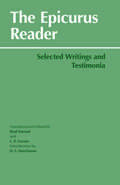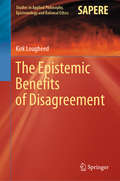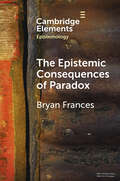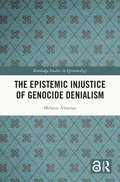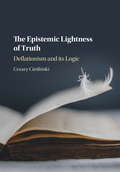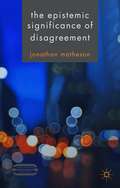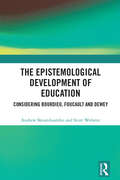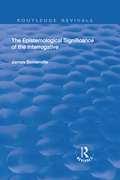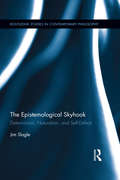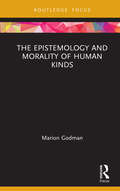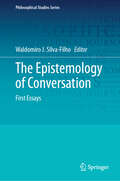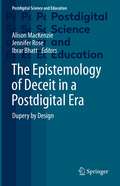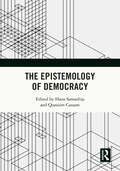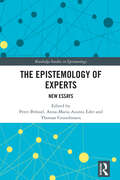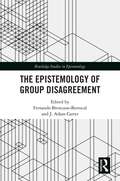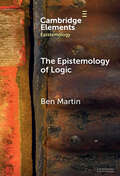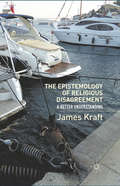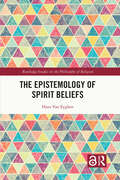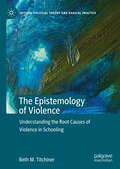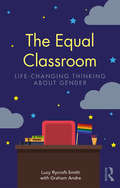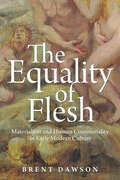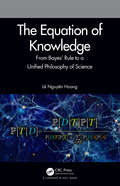- Table View
- List View
The Epicurus Reader: Selected Writings and Testimonia
by Brad Inwood Epicurus Lloyd P. GersonTABLE OF CONTENTS:Introduction The ancient biography of Epicurus The extant letters Ancient collections of maxims Doxographical reports The testimony of Cicero The testimony of Lucretius The polemic of PlutarchShort fragments and testimonia from known works: * From On Nature * From the Puzzles * From On the Goal * From the Symposium * From Against Theophrastus * Fragments of Epicurus' lettersShort fragments and testimonia from uncertain works: * Logic and epistemology * Physics and theology * EthicsIndex
The Epistemic Benefits of Disagreement (Studies in Applied Philosophy, Epistemology and Rational Ethics #51)
by Kirk LougheedThis book presents an original discussion and analysis of epistemic peer disagreement. It reviews a wide range of cases from the literature, and extends the definition of epistemic peerhood with respect to the current one, to account for the actual variability found in real-world examples. The book offers a number of arguments supporting the variability in the nature and in the range of disagreements, and outlines the main benefits of disagreement among peers i.e. what the author calls the benefits to inquiry argument.
The Epistemic Consequences of Paradox (Elements in Epistemology)
by Bryan FrancesBy pooling together exhaustive analyses of certain philosophical paradoxes, we can prove a series of fascinating results regarding philosophical progress, agreement on substantive philosophical claims, knockdown arguments in philosophy, the wisdom of philosophical belief (quite rare, because the knockdown arguments show that we philosophers have been wildly wrong about language, logic, truth, or ordinary empirical matters), the epistemic status of metaphysics, and the power of philosophy to refute common sense. As examples, this Element examines the Sorites Paradox, the Liar Paradox, and the Problem of the Many – although many other paradoxes can do the trick too.
The Epistemic Dimensions of Ignorance
by Rik Peels Martijn BlaauwIgnorance is a neglected issue in philosophy. This is surprising for, contrary to what one might expect, it is not clear what ignorance is. Some philosophers say or assume that it is a lack of knowledge, whereas others claim or presuppose that it is an absence of true belief. What is one ignorant of when one is ignorant? What kinds of ignorance are there? This neglect is also remarkable because ignorance plays a crucial role in all sorts of controversial societal issues. Ignorance is often thought to be a moral and legal excuse; it is a core concept in medical ethics and debates about privacy, and it features in religious traditions and debates about belief in God. This book does not only study an epistemic phenomenon that is interesting in itself, but also provides important tools that can be fruitfully used in debates within and beyond philosophy.
The Epistemic Injustice of Genocide Denialism (Routledge Studies in Epistemology)
by Melanie AltanianThe injustice of genocide denial is commonly understood as a violation of the dignity of victims, survivors, and their descendants, and further described as an assault on truth and memory. This book rethinks the normative relationship between dignity, truth, and memory in relation to genocide denial by adopting the framework of epistemic injustice.This framework performs two functions. First, it introduces constructive normative vocabulary into genocide scholarship through which we can gain a better understanding of the normative impacts of genocide denial when it is institutionalized and systematic. Second, it develops and enriches current scholarship on epistemic injustice with a further, underexplored case study. Genocide denialism is relevant for political and social epistemology, as it presents a substantive epistemic practice that distorts normativity and social reality in ways that maintain domination. This generates pervasive ignorance that makes denial rather than recognition of genocide appear as the morally and epistemically right thing to do. By focusing on the prominent case of Turkey’s denialism of the Armenian genocide, the book shows the serious consequences of this kind of epistemic injustice for the victim group and society as a whole.The Epistemic Injustice of Genocide Denialism will appeal to students and scholars working in social, political, and applied epistemology, social and political philosophy, genocide studies, Armenian studies, and memory studies.The Open Access version of this book, available at www.taylorfrancis.com, has been made available under a Creative Commons Attribution-Non Commercial-No Derivatives (CC-BY-NC-ND) 4.0 license. Any third party material in this book is not included in the OA Creative Commons license, unless indicated otherwise in a credit line to the material. Please direct any permissions enquiries to the original rightsholder.Funded by: Swiss National Science Foundation
The Epistemic Lightness of Truth: Deflationism And Its Logic
by Cezary CieślińskiThis book analyses and defends the deflationist claim that there is nothing deep about our notion of truth. According to this view, truth is a 'light' and innocent concept, devoid of any essence which could be revealed by scientific inquiry. Cezary Cieśliński considers this claim in light of recent formal results on axiomatic truth theories, which are crucial for understanding and evaluating the philosophical thesis of the innocence of truth. Providing an up-to-date discussion and original perspectives on this central and controversial issue, his book will be important for those with a background in logic who are interested in formal truth theories and in current philosophical debates about the deflationary conception of truth.
The Epistemic Significance of Disagreement
by Jonathan MathesonDiscovering someone disagrees with you is a common occurrence. The question of epistemic significance of disagreement concerns how discovering that another disagrees with you affects the rationality of your beliefs on that topic. This book examines the answers that have been proposed to this question, and presents and defends its own answer.
The Epistemological Development of Education: Considering Bourdieu, Foucault and Dewey
by Scott Webster Andrew SkourdoumbisThis book documents the political and economic ramifications of the policy impetus for a ‘science of education’ and what this means for classroom teachers, their teaching practices and for the field of education. In a critical exploration of current research and policy articulations of the purposes of education, with attention given to Australia, the UK and the USA, this book delineates the evaluative mechanisms involved in the strategic science as method adoption of accountability, competitiveness and test-driven criteria used in major education policy. It brings together the disciplines of sociology and philosophy by drawing on the theoretical insights of Michel Foucault, Pierre Bourdieu and John Dewey. In addition, the book argues for the deliberate use of the theoretical in education and is against the contemporary unquestioning advocacy that often accompanies a narrowly defined master narrative of a science of education. This book will be of special interest to post-graduate students as source material in general education courses and is also intended for academics with an interest in educational theory/philosophy and the sociology of education.
The Epistemological Significance of the Interrogative (Ashgate New Critical Thinking In Philosophy Ser.)
by James SomervilleThis title was first published in 2002.This book challenges prevalent assumptions regarding questions and enquiry. It argues that instead of trying to understand questions by reference to knowledge, knowledge can be conceived by reference to the distinctive logical form exhibited by questions. Interrogative logical form has not hitherto been recognised by logicians or philosophers generally. By providing an analysis which can serve as the basis for a fresh start in epistemology, this book breaks new ground.
The Epistemological Skyhook: Determinism, Naturalism, and Self-Defeat (Routledge Studies in Contemporary Philosophy)
by Jim SlagleThroughout philosophical history, there has been a recurring argument to the effect that determinism, naturalism, or both are self-referentially incoherent. By accepting determinism or naturalism, one allegedly acquires a reason to reject determinism or naturalism. The Epistemological Skyhook brings together, for the first time, the principal expressions of this argument, focusing primarily on the last 150 years. This book addresses the versions of this argument as presented by Arthur Lovejoy, A.E. Taylor, Kurt Gödel, C.S. Lewis, Norman Malcolm, Karl Popper, J.R. Lucas, William Hasker, Thomas Nagel, Alvin Plantinga, and others, along with the objections presented by their many detractors. It concludes by presenting a new version of the argument that synthesizes the best aspects of the others while also rendering the argument immune to some of the most significant objections made to it.
The Epistemology and Morality of Human Kinds (Routledge Focus on Philosophy)
by Marion GodmanNatural kinds is a widely used and pivotal concept in philosophy – the idea being that the classifications and taxonomies employed by science correspond to the real kinds in nature. Natural kinds are often opposed to the idea of kinds in the human and social sciences, which are typically seen as social constructions, characterised by changing norms and resisting scientific reduction. Yet human beings are also a subject of scientific study.Does this mean humans fall into corresponding kinds of their own? In The Epistemology and Morality of Human Kinds Marion Godman defends the idea of human kinds. She first examines the scientific use and nature of human kinds, considering the arguments of key philosophers whose work bears upon human kinds, such as Ian Hacking, John Searle, Richard Boyd and Ruth Millikan. Using the examples of gender, ethnic minorities and Buddhism she then argues that human kinds are a result of ongoing historical reproduction, chiefly due to pre-existing cultural models and social learning. Her novel argument shifts the focus away from the reductionism characteristic of research about human kinds. Instead, sheargues that they are “multiply projectable” and deserving of scientific study not in spite of, but because of their role in explaining our identity, injusticeand the emergence of group rights.
The Epistemology of Conversation: First Essays (Philosophical Studies Series #156)
by Waldomiro J. Silva-FilhoThis edited volume presents an innovative perspective on conversation and is the first book to deal with the epistemic aspects of conversation or dialogue. "Conversation" has been a recurring subject in various fields of philosophy, such as moral philosophy, pragmatics, and the philosophy of language. This text assumes conversation as a joint agency and explores when participants assume common purposes, commit to contributing relevant statements, and face the challenges of confronting interlocutors. It investigates whether the norm of conversation can be reduced to the interaction between speaker and audience, where the speaker must speak the truth and the audience must understand this intention. This volume explores the epistemology of testimony and addresses the motivations for starting a conversation, which can include legitimate disagreements, as well as curiosities about the interlocutor's beliefs and shared doubts. This text contributes to understanding epistemic dynamics in contemporary liberal democracies, such as polarization, disintegration of epistemic communities, silencing, and epistemic injustices. It appeals to students and researchers.
The Epistemology of Deceit in a Postdigital Era: Dupery by Design (Postdigital Science and Education)
by Jennifer Rose Ibrar Bhatt Alison MacKenzieThis edited book collection offers strong theoretical and philosophical insight into how digital platforms and their constituent algorithms interact with belief systems to achieve deception, and how related vices such as lies, bullshit, misinformation, disinformation, and ignorance contribute to deception. This inter-disciplinary collection explores how we can better understand and respond to these problematic practices. The Epistemology of Deceit in a Postdigital Era: Dupery by Design will be of interest to anyone concerned with deception in a ‘postdigital’ era including fake news, and propaganda online. The election of populist governments across the world has raised concerns that fake news in online platforms is undermining the legitimacy of the press, the democratic process, and the authority of sources such as science, the social sciences and qualified experts. The global reach of Google, YouTube, Twitter, Facebook, and other platforms has shown that they can be used to create and spread fake and misleading news quickly and without control. These platforms operate and thrive in an increasingly balkanised media eco-system where networks of users will predominantly access and consume information that conforms to their existing worldviews. Conflicting positions, even if relevant and authoritative, are suppressed, or overlooked in everyday digital information consumption. Digital platforms have contributed to the prolific spread of false information, enabled ignorance in online news consumers, and fostered confusion over determining fact from fiction. The collection explores: Deception, what it is, and how its proliferation is achieved in online platforms. Truth and the appearance of truth, and the role digital technologies play in pretending to represent truth. How we can counter these vices to protect ourselves and our institutions from their potentially baneful effects. Chapter 15 is available open access under a Creative Commons Attribution 4.0 International License via link.springer.com.
The Epistemology of Democracy
by Quassim CassamThis is the first edited scholarly collection devoted solely to the epistemology of democracy. Its 15 chapters, published here for the first time and written by an international team of leading researchers, will interest scholars and advanced students working in democratic theory, the harrowing crisis of democracy, political philosophy, social epistemology, and political epistemology. The volume is structured into three parts, each offering five chapters. The first part, Democratic Pessimism, covers the crisis of democracy, the rise of authoritarianism, public epistemic vices, misinformation and disinformation, civic ignorance, and the lacking quantitative case for democratic decision-making. The second part, Democratic Optimism, discusses the role of hope and positive emotions in rebuilding democracy, proposes solutions to myside bias, and criticizes dominant epistocratic approaches to forming political administrations. The third and final part, Democratic Realism, assesses whether we genuinely require emotional empathy to understand the perspectives of our political adversaries, discusses the democratic tension between mutual respect for others and a quest for social justice, and evaluates manifold top-down and bottom-up approaches to policy making.
The Epistemology of Experts: New Essays (Routledge Studies in Epistemology)
by Thomas Grundmann Peter Brössel Anna-Maria Asunta EderThis volume presents new research on the epistemology of experts. It features original essays from leading epistemologists on this timely topic.Modern societies benefit significantly from a certain kind of epistemic division of labor: they outsource much of their epistemic work to well-trained cognitive experts. However, due to their degree of specialization, cognitive sophistication, and highly privileged status, cognitive experts tend to become alienated from laypeople. This leads to what one may call the paradox of experts: as experts become more competent, specialized, and sophisticated, the harder it will be for laypeople to identify and trust experts. The chapters in this volume explore the epistemology of expert judgment across several core themes and crucial questions: Analysis of Experts: What does it take to be a cognitive expert? Epistemic Authority: How much should we concede experts over laypeople? The Social Roles of Experts: What role do experts play in society, and what role should they play? Challenges: What problems arise from experts’ epistemic authority and societal role? The Epistemology of Experts is an essential resource for scholars and advanced students working in epistemology, philosophy of science, political philosophy, and the sociology of knowledge.
The Epistemology of Group Disagreement (Routledge Studies in Epistemology)
by J. Adam Carter Fernando Broncano-BerrocalThis book brings together philosophers to investigate the nature and normativity of group disagreement. Debates in the epistemology of disagreement have mainly been concerned with idealized cases of peer disagreement between individuals. However, most real-life disagreements are complex and often take place within and between groups. Ascribing views, beliefs, and judgments to groups is a common phenomenon that is well researched in the literature on the ontology and epistemology of groups. The chapters in this volume seek to connect these literatures and to explore both intra- and inter- group disagreements. They apply their discussions to a range of political, religious, social, and scientific issues. The Epistemology of Group Disagreement is an important resource for students and scholars working on social and applied epistemology; disagreement; and topics at the intersection of epistemology, ethics, and politics.
The Epistemology of Indicative Conditionals
by Igor DouvenConditionals are sentences of the form 'If A, then B', and they play a central role in scientific, logical, and everyday reasoning. They have been in the philosophical limelight for centuries, and more recently, they have been receiving attention from psychologists, linguists, and computer scientists. In spite of this, many key questions concerning conditionals remain unanswered. While most of the work on conditionals has addressed semantical questions - questions about the truth conditions of conditionals - this book focuses on the main epistemological questions that conditionals give rise to, such as: what are the probabilities of conditionals? When is a conditional acceptable or assertable? What do we learn when we receive new conditional information? In answering these questions, this book combines the formal tools of logic and probability theory with the experimental approach of cognitive psychology. It will be of interest to students and researchers in logic, epistemology, and psychology of reasoning.
The Epistemology of Logic (Elements in Epistemology)
by Ben MartinCompared to our appreciation of the epistemology of the sciences and mathematics, we have a relatively poor understanding of the epistemology of logic. This Element highlights three causes of this lack of progress: (i) failure to distinguish between the epistemology of logical theorising and that of good (logical) reasoning; (ii) hesitancy to base epistemology of logic on how logicians actually justify their logics, rather than our own presumptions about logic; and (iii) a presumption that the epistemology of logic must be significantly different to other research areas, such as the recognised sciences. The Element ends by highlighting what can be achieved by avoiding these pitfalls, presenting an account of theory-choice in logic, logical predictivism, motivated by actual logical practice, which suggests that the mechanisms of theory-choice in logic are not that different to those in the recognised sciences. This title is also available as Open Access on Cambridge Core.
The Epistemology of Religious Disagreement
by James KraftMany assume falsely that religious disagreements engage rules of evidence presentation and belief justification radically different than the ordinary disagreements people have every day, whether those religious disagreements are in Sri Lanka between Hindus and Buddhists or in the Middle East among Jews, Christians, and Muslims.
The Epistemology of Spirit Beliefs (Routledge Studies in the Philosophy of Religion)
by Hans Van EyghenThis book assesses whether belief in spirits is epistemically justified. It presents two arguments in support of the existence of spirits and arguments that experiences of various sorts (perceptions, mediumship, possession and animistic experiences) can lend justification to spirit-beliefs. Most work in philosophy of religion exclusively deals with the existence of God or the epistemic status of belief in God. Spirit beliefs are often regarded as aberrations, and the falsity of such beliefs is often assumed. This book argues that various beliefs concerning spirits can be regarded as justified when they are rooted in experiences that are not defeated. It argues that spirit-beliefs are not defeated by recent theories put forth by neuroscientists, cognitive scientists or evolutionary biologists. Additional arguments are made that traditional theistic belief is epistemically linked to spirit beliefs and that unusual events can be explained in terms of spirit-activity. The book draws on theistic arguments, phenomenal conservatism and defenses of religious experiences to argue for the justification of spirit-beliefs. The arguments draw on examples from various religious traditions ranging from Christianity and Islam to Haitian Vodou and Tibetan Bon. The Epistemology of Spirit Beliefs will be of interest to researchers and advanced students working in philosophy of religion, religious epistemology, ethnography and cognitive neuroscience.
The Epistemology of Spirit Beliefs (Routledge Studies in the Philosophy of Religion)
by Hans Van EyghenThis book assesses whether belief in spirits is epistemically justified. It presents two arguments in support of the existence of spirits and arguments that experiences of various sorts (perceptions, mediumship, possession and animistic experiences) can lend justification to spirit-beliefs.Most work in philosophy of religion exclusively deals with the existence of God or the epistemic status of belief in God. Spirit beliefs are often regarded as aberrations, and the falsity of such beliefs is often assumed. This book argues that various beliefs concerning spirits can be regarded as justified when they are rooted in experiences that are not defeated. It argues that spirit-beliefs are not defeated by recent theories put forth by neuroscientists, cognitive scientists or evolutionary biologists. Additional arguments are made that traditional theistic belief is epistemically linked to spirit beliefs and that unusual events can be explained in terms of spirit-activity. The book draws on theistic arguments, phenomenal conservatism and defenses of religious experiences to argue for the justification of spirit-beliefs. The arguments draw on examples from various religious traditions ranging from Christianity and Islam to Haitian Vodou and Tibetan Bon.The Epistemology of Spirit Beliefs will be of interest to researchers and advanced students working in philosophy of religion, religious epistemology, ethnography and cognitive neuroscience.The Open Access version of this book, available at www.taylorfrancis.com, has been made available under a Creative Commons Attribution-NonCommercial (CC-BY-NC) 4.0 International license.
The Epistemology of Violence: Understanding the Root Causes of Violence in Schooling (Critical Political Theory and Radical Practice)
by Beth M. TitchinerThis book provides an in-depth, multidisciplinary framework and case-study analysis for understanding the root causes of violence in schooling. Drawing on critical theory, psychology, neuroscience and learning theory, the author provides a holistic analysis of how ‘violent epistemology’ and the ‘non-conducive circumstances’ that it produces can be seen to be at the roots of violence in societies and social institutions such as schools. Chapter 1 outlines how current and historical theories of violence, and interventions based on them, have failed due to their inability to properly conceptualise the root causes of violence. Chapters 2 addresses this by providing a new epistemic and methodological framework for studying violence. Chapters 3 and 4 then demonstrate how violence can be best conceptualised as a problem of specifically ‘violent’ epistemology and the ‘non-conducive social circumstances’ that it fosters. Chapters 5-7 demonstrate in practice how violent epistemology results in multiple manifestations of violence at the global, national, local, and ultimately classroom level. Chapter 8 concludes the book by presenting an early conceptualisation of ‘non-violent’ epistemology, and what fostering this might look like in practice.
The Equal Classroom: Life-Changing Thinking About Gender
by Lucy Rycroft-Smith Graham AndreHow much thinking have you done about gender? What does it feel like to be gay, trans or non-binary at school? How unbiased, safe and inclusive are our teachers, our schools and our systems, and what can we do about it? The time is ripe for a re-think, and the issues are pressing. Our pupils are grappling with challenges around gender and sexuality, and they need our well-informed support. Providing evidence, prompts and the space to explore the implications, restrictions and constructs of gender, this book is here to help every teacher reflect on issues around gender roles and expectations in their class. In this challenging and potent book, experts, academics and campaigners join forces to contribute important perspectives to complement Rycroft-Smith’s own accessible and often provocative explanations of many facets of gender and sexuality, including media, literature, toys, clothing, sexism, expectations, sexuality, gender roles, harassment and consent. Humour and anecdotes are thoughtfully intertwined with fascinating insights into biological and cultural perspectives and societal norms, highlighting why it’s so vital to teach pupils about gender issues, as well as modelling consent, good quality relationships and tolerance to children at all ages and stages of their school career. Providing clear, practical policy recommendations in an accessible and engaging way, The Equal Classroom is an essential read for any teacher or education professional who wants to ensure their school is a place where all pupils feel truly welcome and able to flourish, comfortable and safe in their emerging identities.
The Equality of Flesh: Materialism and Human Commonality in Early Modern Culture
by Brent DawsonThe Equality of Flesh traces a new genealogy of equality before its formalization under liberalism. While modern ideas of equality are defined through an inner human nature, Brent Dawson argues that the sixteenth and seventeenth centuries conceptualized equality as an ambivalent and profoundly bodily condition. Everyone was made from the same lowly matter and, as a result, shared the same set of vulnerabilities, needs, and passions. Responding to the political upheavals of colonialism and the intellectual turmoil of new natural philosophies, leading figures of the English Renaissance, including Edmund Spenser and William Shakespeare, anxiously imagined that bodily commonality might undermine differences of religion, race, and class.As the period progressed, later authors developed the revolutionary possibilities of bodily equality even as new ideas of fixed racial inequality emerged. Some—like the utopian radical Gerrard Winstanley and the republican poet John Milton—challenged political absolutism through the idea of humans as base, embodied creatures. Others—like the heterodox philosopher Margaret Cavendish, the French theologian Isaac La Peyrère, and the libertine Cyrano de Bergerac—offered limited yet important interrogations of racial paradigms. This moment, Dawson shows, would pass, as bodily equality was marginalized in the liberal theories of John Locke and Thomas Hobbes. In its place, during the Enlightenment pseudoscientific racism would come to anchor inequality in the body. Contending with the lasting implications of material equality for modernity, The Equality of Flesh shows how increasingly vehement notions of racial difference eclipsed a nascent sense of human commonality rooted in the basic stuff of life.
The Equation of Knowledge: From Bayes' Rule to a Unified Philosophy of Science
by Lê Nguyên HoangThe Equation of Knowledge: From Bayes' Rule to a Unified Philosophy of Science introduces readers to the Bayesian approach to science: teasing out the link between probability and knowledge. The author strives to make this book accessible to a very broad audience, suitable for professionals, students, and academics, as well as the enthusiastic amateur scientist/mathematician. This book also shows how Bayesianism sheds new light on nearly all areas of knowledge, from philosophy to mathematics, science and engineering, but also law, politics and everyday decision-making. Bayesian thinking is an important topic for research, which has seen dramatic progress in the recent years, and has a significant role to play in the understanding and development of AI and Machine Learning, among many other things. This book seeks to act as a tool for proselytising the benefits and limits of Bayesianism to a wider public. Features Presents the Bayesian approach as a unifying scientific method for a wide range of topics Suitable for a broad audience, including professionals, students, and academics Provides a more accessible, philosophical introduction to the subject that is offered elsewhere
